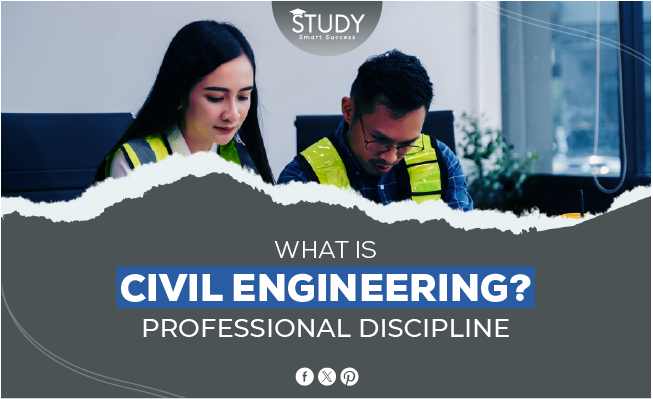Civil engineering uses imagination, technical know-how, and the ability to solve problems to plan, build, and manage our infrastructure. If you want to become a civil engineer, are an engineering student, or are just looking for a career change, this piece can help you.
What is Civil Engineering?
Civil engineering is one of the oldest types of engineering. It designs, builds, and cares for infrastructure projects and structures like roads, bridges, buildings, and water supply systems. Civil engineers are critical to the built environment because they ensure that buildings are safe, efficient, and long-lasting.
Educational Pathways
1. Obtain a High School Diploma or Equivalent
Finishing high school or getting a GED is the first thing you must do to become a civil engineer. Pay special attention to doing well in math, physics, chemistry, and computer science. Participating in similar events outside of school can also be helpful, like math clubs or science shows.
2. Earn a Bachelor’s Degree in Civil Engineering
It would be best if you usually had a bachelor’s degree in civil engineering from a recognized school to get a job in this field. It usually takes four years to finish this school, which covers important topics like
- Structural Analysis and Design
- Fluid Mechanics
- Geotechnical Engineering
- Transportation Engineering
- Environmental Engineering
- Construction Management
Many schools also allow students to learn by doing in labs, classes, and jobs, which are great ways to get real-world experience and learn valuable skills.
3. Consider Specializations
A general civil engineering degree gives you a solid base, but focusing on a particular area can help you advance in your job. Some typical specialities are:
- Structural Engineering
- Environmental Engineering
- Transportation Engineering
- Geotechnical Engineering
- Water Resources Engineering
To specialize, you might need to take more classes, attend workshops, and work on specific study projects.
4. Pursue an Advanced Degree (Optional)
While it’s not always necessary, getting a master’s or even a PhD in civil engineering can help you learn more, get better jobs, and advance in your work by taking on leadership or teaching roles.
5. Obtain Professional Licensure
You will need to get licensed to become a qualified professional engineer (PE), which is often required for higher-level jobs and leading positions in civil engineering. Usually, this process has several steps:
- Pass the Fundamentals of Engineering (FE) Exam: Most people take the FE test soon after getting their bachelor’s degree. It teaches basic engineering skills and is the first thing you must do to become a skilled engineer.
- Gain Work Experience: A licensed PE must supervise your relevant work experience after completing the FE test. The needed expertise varies by location but is usually four to five years.
- Pass the Principles and Practice of Engineering (PE) Exam: After gaining work experience, you may take the PE test in your field. The PE license certifies you as a professional engineer after passing this test.
6. Continuous Learning and Professional Development
Civil engineering changes with technology, materials, and methods. Maintaining your knowledge and career greatness requires staying current with industry advances. The following methods of continual learning are beneficial:
- Continuing Education Courses and Workshops: Many professional organizations provide courses, workshops, and seminars to update your knowledge and skills.
- Professional Organizations: American Society of Civil Engineers (ASCE) members offer networking, tools, and industry trends.
- Certifications: Additional civil engineering certificates might boost your employment opportunities and certify your competence.
- Conferences and Symposia: Attending industry conferences and symposia lets you learn from specialists, showcase your work, and network with civil engineers.
Follow these steps and promise to keep learning. You can have a significant and satisfying job as a civil engineer, helping to build critical infrastructure and improving people’s lives.
Licensing and Certification
1. Gain Professional Experience
In most places, people who want to become civil engineers have to get work experience through internships or entry-level jobs after getting their bachelor’s degree. This training is essential for gaining real-world skills and meeting license standards.
2. Pass the Fundamentals of Engineering (FE) Exam
The FE exam, also called the Engineer-in-Training (EIT) exam, is a standard test that checks how well you understand basic engineering ideas. Often, passing this test is the first thing that you need to do to become a qualified professional engineer (PE).
3. Complete Required Work Experience
Once you’ve passed the FE test, you’ll need to get some work experience, usually under the watchful eye of a certified PE. Different places have different standards, but in general, you must have between 2 and 4 years of work in the field.
4. Pass the Principles and Practice of Engineering (PE) Exam
After enough experience, you may take the PE exam, which assesses civil engineering skills. After passing this test, you may sign off on projects and take on more responsibility as a qualified PE.
5. Maintain Your PE License
Getting your Professional Engineer (PE) license is a big deal, but keeping it takes work. Most areas demand continuing education to keep licensed engineers current on industry trends and best practices. These criteria usually include:
- Completing Continuing Education Units (CEUs): Engineers must obtain CEUs via seminars, online courses, or university programs within a defined timeframe.
- Attending Workshops and Conferences: Industry gatherings may inform you about new technology and trends.
- Renewing Your License: Licenses must be renewed frequently, which may require evidence of continuing education and a price.
6. Career Advancement Opportunities
There are several job possibilities for civil engineers. These changes rely on your interests, specialization, and desire to take on more. Options for progress include:
- Project Management: A project management role allows you to oversee entire projects from inception to completion, coordinating teams, schedules, and budgets.
- Consulting: Experienced engineers may become consultants, providing expert advice and innovative solutions to complex engineering problems for various clients.
- Academic and Research Positions: Those with advanced degrees may choose careers in academia, teaching future engineers, or researching to push the boundaries of civil engineering knowledge.
- Leadership Roles: With significant experience, civil engineers can move into executive positions within engineering firms or government agencies, influencing policy and strategic decision-making.
7. Emerging Trends in Civil Engineering
Civil engineering continuously evolves, with new technologies and methodologies shaping how infrastructure projects are planned, designed, and executed. Some emerging trends include:
- Sustainable Design: The emphasis on green building practices and sustainable design is increasing. These practices focus on minimizing environmental impact and promoting resource efficiency.
- Smart Infrastructure: Integrating intelligent systems and IoT (Internet of Things) technologies into infrastructure projects is enhancing the monitoring and management of urban environments.
- Advanced Materials: Innovations in materials science are developing more robust, durable, and eco-friendly construction materials.
- BIM (Building Information Modeling): BIM technology revolutionises how engineers plan and manage projects, offering detailed digital representations of buildings’ physical and functional characteristics.
By staying informed about these trends and continually developing your skills and expertise, you can position yourself at the forefront of civil engineering and contribute to creating more advanced, sustainable, and resilient infrastructure.
Skills and Competencies
Technical Skills
- Proficiency in computer-aided design (CAD) software
- Strong understanding of engineering principles and mathematics
- Ability to interpret technical drawings and specifications
Soft Skills
- Problem-solving and critical thinking
- Effective communication and teamwork
- Project management and organizational abilities
- Attention to detail and accuracy
Continuing Education
Civil engineers must follow industry developments, technology, and regulations. You may stay competitive by taking continuing education courses, attending conferences, and joining professional organizations like the American Society of Civil Engineers (ASCE).
Career Opportunities
Civil engineers work in various sectors, including:
- Government agencies (e.g., Department of Transportation, Environmental Protection Agency)
- Private engineering firms
- Construction companies
- Consulting services
- Non-profit organizations
Job titles include project manager, structural engineer, environmental consultant, and transportation planner.
Conclusion
Becoming a civil engineer is challenging but rewarding. It requires a thorough education, practical experience, and lifelong learning. Follow this roadmap to a successful civil engineering career and help build safe, sustainable, creative infrastructure.
If you want to further your engineering career, choose a civil engineering degree or internship. Becoming a civil engineer is difficult, but the benefits of making a difference are worth it.


